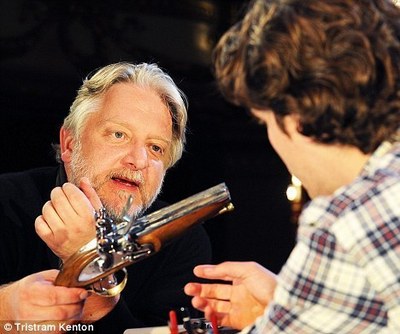Deathtrap, Noel Coward Theatre
reviewed for The Spectator, 11 September 2010
 When was the last time you shuddered in the stalls as a deathly thriller played out on stage? It’s a long time since the heyday of the West End whodunnit, when audiences piled tight into theatres only to better leap from their seats and squeal each time Death struck again. The world expert on modern storytelling structures, Princeton professor Peter Brooks, claims that rise of the thriller was directly related to middle class anxiety about social and familial disorder – perhaps, in Broken Britain, there are few suffocating nuclear families from which to escape, and the chaos of the outside world is less of a shocking intrusion than a constant presence. Or perhaps their place has been taken by cosy ITV mysteries – chintzy reminders in Midsummer Murders or Marple of an imaginary time when murder was middle class, and could always eventually be diagnosed and contained. Screen horrors can still thrill, but they’re fundamentally safer than live theatre: however much the villain may rant and rave when Poirot confronts him, he can’t leap through the television, whereas if you’re stuck in an enclosed space with the cast of Ira Levin’s Deathtrap, there’s no knowing what they might to do you.
When was the last time you shuddered in the stalls as a deathly thriller played out on stage? It’s a long time since the heyday of the West End whodunnit, when audiences piled tight into theatres only to better leap from their seats and squeal each time Death struck again. The world expert on modern storytelling structures, Princeton professor Peter Brooks, claims that rise of the thriller was directly related to middle class anxiety about social and familial disorder – perhaps, in Broken Britain, there are few suffocating nuclear families from which to escape, and the chaos of the outside world is less of a shocking intrusion than a constant presence. Or perhaps their place has been taken by cosy ITV mysteries – chintzy reminders in Midsummer Murders or Marple of an imaginary time when murder was middle class, and could always eventually be diagnosed and contained. Screen horrors can still thrill, but they’re fundamentally safer than live theatre: however much the villain may rant and rave when Poirot confronts him, he can’t leap through the television, whereas if you’re stuck in an enclosed space with the cast of Ira Levin’s Deathtrap, there’s no knowing what they might to do you.
Certainly, since real life got more unpredictable in the 70s, only two thrillers have established long-term presences in the West End, The Mousetrap, a tourist institution, and the magnificent, vein-freezing Woman in Black, based on the novel by fellow Spectator Arts Blog -contributor Susan Hill. Even Deathtrap, newly revived at the Noel Coward theatre, didn’t secure a transfer to London during its initial four year run in New York. It’s a masterpiece of plotting, both on the part of the author and of the various characters with their competing masterplans. Levin’s protagonist, Sidney Bruhl, is himself a playwright, who opens the play by confessing his crippling envy of a talented young protégée. The student, played by the magnetic Jonathan Groff, arrives at Bruhl’s house clutching the only copy of his new play – and Bruhl, desperate for a hit after years of creative and financial decline, seems sorely tempted to steal the script and bash the boy’s skull in with one of the many vintage stage weapons he just happens to keep lying about the house.
Deathtrap is keenly concerned with its place in the grand tradition of the thriller. It can be painfully self-referential, eventually eliciting groans, although after the initial twist the knowing comments about life imitating art take on a greater resonance. Bruhl, played by Simon Russell Beale, lectures his apprentice on the history of 20th century theatre, right down to the late 1970s, the play’s supposed date, at which point the success of Anthony Shaffer’s Sleuth had left men like Bruhl floundering in its wake. So given the importance of this point in theatrical history, there’s surprisingly little effort put in to establish a 70s period setting. If it weren’t for the constant references to Xeroxes and typewriters, one might be forgiven for forgetting we’re not still in the 21st century.
Fundamentally, Deathtrap is great fun. Many theatre-goers will consider Simon Russell Beale’s name alone reason to pay for a ticket, and they won’t be disappointed. Simon Russell Beale could turn a road-safety lecture into the most nuanced of dramatic monologues, and his Bruhl is a devastatingly precise study in middle-aged self-loathing. Groff, too, is deeply charismatic, yet the relationship between student and professor is unconvincing – the twists and turns of the script give little time for real development, and both are at their best when performing in front of third parties. Groff has been billed as a heartthrob from US TV show Glee, but he’s no Hollywood kid parachuted in to boost the box office – his rise through Broadway was earned the hard way, waiting NYC tables to supplement a chorus-line salary before proving both his stamina and his subtlety as Melchior in Spring Awakening, the acclaimed rock musical based on Franz Wedekind’s play of teenage rebellion, which Groff headlined eight times a week for eighteen months.
Beside these two, Claire Skinner, an actress of exceptional talent, is woefully miscast as Bruhl’s wife. Skinner’s youthful and innocent style makes it impossible for anyone to fear that a heart attack might a carry her off at any moment, still less that she’s spent a lifetime enduring the gripes of Bruhl himself.
Deathtrap is by turns sententious and uproarious, full of surprises, yet occasionally far more predictable than it pretends. But it will make you leap out of your seat several times. So don’t take along your great-aunt with the weak heart. Unless you know she’s left you a whopper of an inheritance.






